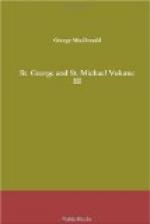So saying Dorothy left him to what consolation he could find in such china-pastoral abuse as the gallants of the day would, with the aid of poetic penny-trumpet, cast upon offending damsels—Daphnes and Chloes, and, in the mood, heathen shepherdesses in general. But, fortunately for himself, how great soever had been the freedom with which he had lost and changed many a foolish liking, he found, let his hopelessness or his offence be what it might, he had not the power to shake himself free from the first worthy passion ever roused in him. It had struck root below the sandy upper stratum of his mind into a clay soil beneath, where at least it was able to hold, and whence it could draw a little slow reluctant nourishment.
During his poetic anger, he wrote no small amount of fair verse, tried by the standard of Cowley, Carew, and Suckling, so like theirs indeed that the best of it might have passed for some of their worst, although there was not in it all a single phrase to remind one of their best. But when the poetic spring began to run dry, he fell once more into a sort of wilful despair, and disrelished everything, except indeed his food and drink, so much so that his master perceiving his altered cheer, one day addressed him to know the cause.
‘What aileth thee, Rowland?’ he said kindly. ’For this se’ennight past, thou lookest like one that oweth the hangman his best suit.’
‘I rust, my lord,’ said Rowland, with a tragic air of discontent.
The notion had arisen in his foolish head that the way to soften the heart of Dorothy would be to ride to the wars, and get himself slain, or, rather severely but not mortally wounded. Then he would be brought back to Raglan, and, thinking he was going to die, Dorothy would nurse him, and then she would be sure to fall in love with him. Yes—he would ride forth on the fellow Heywood’s mare, seek him in the field of battle, and slay him, but be himself thus grievously wounded.
‘I rust, my lord,’ he said briefly.
’Ha! Thou wouldst to the wars! I like thee for that, boy. Truly the king wanteth soldiers, and that more than ever. Thou art a good cupbearer, but I will do my best to savour my claret without thee. Thou shalt to the king, and what poor thing my word may do for thee shall not be wanting.’
Scudamore had expected opposition, and was a little nonplussed. He had judged himself essential to his master’s comfort, and had even hoped he might set Dorothy to use her influence towards reconciling him to remain at home. But although self-indulgent and lazy, Scudamore was constitutionally no coward, and had never had any experience to give him pause: he did not know what an ugly thing a battle is after it is over, and the mind has leisure to attend to the smarting of the wounds.
‘I thank your lordship with all my heart,’ he said, putting on an air of greater satisfaction than he felt, ’and with your lordship’s leave would prefer a further request.’




